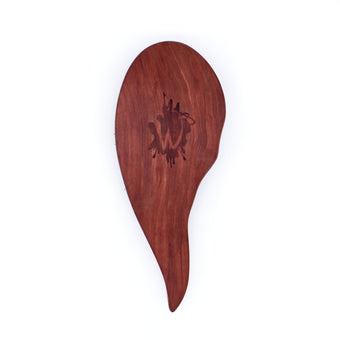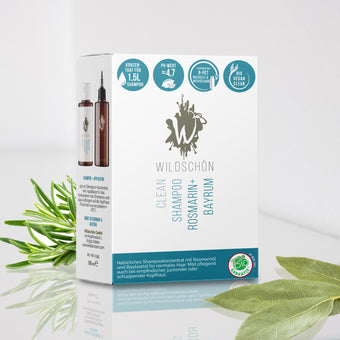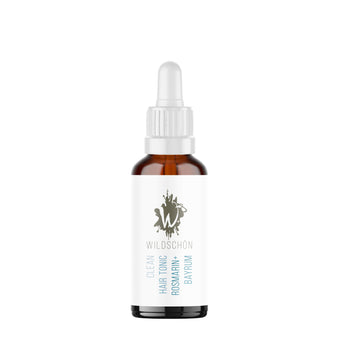Menopause and hair loss: What helps with hair loss in menopause
- What are the causes of hair loss during menopause?
- How can nature-identical hormones help?
- How can nutrients promote hair growth and reduce hair loss?
- Why are brushing and natural hair care so important?
Sleep disorders, mood swings, weight gain - every woman experiences the menopause with its very individual side effects. Hormonal hair loss , which is one of the more common side effects in this phase of life, is particularly stressful for many women. In this article, you'll learn more about menopause in general and how it affects your hair in particular. We will also explain what you can do to get hair loss under control during the menopause - without chemicals , but in a natural way.
What exactly is menopause - and who is affected?
Menopause is a natural part of the female life cycle that heralds the end of fertility. They are considered complete when there has been no menstrual bleeding for at least a year. The time of the last bleeding is called the menopause. It is not a disease, but a natural transition process . On average, menopause occurs at the age of 51, while the average onset of menopause is around 48 years.
Menopause is caused by the drop in hormone production, specifically estrogen and progesterone , responsible for regulating the menstrual cycle. During menopause, there are a number of changes in the body that can lead to various symptoms, including hot flashes, trouble sleeping, mood swings, vaginal dryness, and decreased sex drive. These symptoms can be very pronounced in some women while others hardly notice them - nature is sometimes unfair...

Ultimately, however, all women who reach the age at which they lose their ability to reproduce are affected by the actual consequences. And there are many: At this point in time, there are around 1.2 billion women between the ages of 50 and 80 worldwide. In Germany, around 13 million women are aged 50 or older. Why do we still hear so little about this topic? Why is there so little research and reporting even in conventional medicine and in gynecological journals? We think: This should change urgently!
The ten most common side effects of menopause in detail
- Hot flashes: sudden waves of warmth in the face, neck and chest, accompanied by profuse sweating.
- Insomnia: Difficulty falling asleep or staying asleep, accompanied by tiredness during the day.
- Hair Loss: Many women experience hair loss or thinning of hair during menopause due to hormonal changes.
- Mood swings: emotional imbalances, irritability, depression, anxiety and frequent mood swings.
- Changes in menstrual cycles: Menstrual cycles can become irregular, longer or shorter, lighter or heavier.
- Dry skin and mucous membranes: Vaginal dryness, itching and burning, as well as dry and itchy skin, for example on the head.
- Weight gain: Hormonal changes can cause women to gain weight, especially around the abdomen.
- Loss of Libido: Less interest in sex due to hormonal changes and physical changes.
- Memory and concentration problems: Difficulty remembering things, poor concentration and mental fatigue.
- Breast Pain: Tenderness and pain in the breasts can occur with menopause.
What are the causes of hair loss during menopause?
While hormonal changes can affect the body in different ways, one of the most common effects affects women in a very personal way: hair loss. But what are the actual reasons for this? To answer this question, we need to take a look at the hormonal changes that take place during menopause.
When hormone production in the body decreases, it also affects the hair follicles responsible for hair growth. In particular, the decline in the hormone estrogen can cause hair to become thinner, more brittle and eventually fall out . But there are other factors that cause hair to thin during menopause. As an overview, you will find the most important triggers here, which we will take a closer look at below:
- The hormonal change and its influence on the hair follicles.
- The diet and the lack of certain micronutrients.
- Stress , grief or other emotionally distressing experiences.
- A scalp that is not optimally supplied with blood, flaky or dry.
- Harsh or potentially hormonally active ingredients in conventional hair care and styling products.
Let's take a closer look at the individual triggers and possible solutions.
How can nature-identical hormones help with hair loss during menopause?
Estrogens are a group of female hormones produced by the ovaries in the female body. They are important in the development and maintenance of female sexual characteristics and also have a variety of other functions in the body such as regulating the menstrual cycle, protecting bones from osteoporosis and maintaining skin elasticity. In the context of hair loss during menopause, estrogens play an important role as they directly affect hair growth . When estrogen levels drop in the body, as occurs during menopause, it can lead to hair follicle miniaturization , which means hair thins and eventually falls out.
By taking nature-identical estrogens, women can increase estrogen levels in the body and thus reduce hair loss. Estrogens work in several ways: they inhibit the activity of enzymes responsible for hair loss, they promote hair growth by lengthening the hair cycle, and they stimulate the activity of hair follicles, making hair stronger and thicker .
Compared to synthetic hormones, nature-identical hormones have the following: They have a structure that is absolutely identical to the structure of endogenous hormones. For this reason, they are also referred to as bio-identical hormones. In contrast to synthetic hormones, which usually have a modified chemical structure and are rightly criticized. But beware: Natural hormones can also have side effects. Hormone therapy should therefore always be carried out under medical supervision in order to carefully weigh up the possible risks and benefits. A good point of contact is your family doctor or specialized counseling services .
Vitamins & Co.: A healthy diet can promote hair growth and reduce hair loss.
Health experts agree that a balanced diet can make an important contribution to skin and hair health . For example, legumes like lentils and beans are excellent sources of protein and iron , which are essential for hair growth and hair health. Leafy green vegetables like spinach and kale are rich in vitamins, minerals, and antioxidants that help strengthen hair and make it shine. Seeds and nuts like chia seeds, flaxseeds and walnuts can also help promote hair growth and keep it healthy as they contain omega-3 fatty acids and vitamin E.
Conversely, a lack of certain nutrients - especially during menopause - can exacerbate hair loss. High-quality and specialized dietary supplements can help here, but they are never a substitute for a healthy lifestyle and a balanced diet. Since we, as a manufacturer, are not allowed to offer any health advice, we are subject to strict legal limits when it comes to making statements about the effects of food - we have to orient ourselves very closely to the so-called "health claims", i.e. the health-related statements permitted for manufacturers. This makes this text a bit cumbersome, but we want to give you serious and legally correct advice. Here are what we consider to be the most important nutrients for healthy hair:
- Vitamins B1, B2 and B6 support the formation of red blood cells, which transport oxygen and nutrients to the hair roots. The official health claim puts it this way, for example: Thiamine (B1) contributes to the normal formation of red blood cells. Riboflavin (B2) contributes to the maintenance of normal red blood cells and the normal supply of oxygen to the body. You should make sure that the vitamins come from a natural source and are not synthetically produced.
- Vitamin B7, also known as biotin , is particularly important for your healthy hair. The permissible health claim is: Biotin contributes to the maintenance of normal hair. Again, you should pay attention to a natural source of vitamins.
- The trace element silicon, ideally from a natural source such as bamboo, strengthens the connective tissue that anchors the hair in the scalp and improves the hair's elasticity. The substance you may know as silicic acid can be found in nature wherever strength, elasticity and flexibility are important. Health-related statements are not permitted, but numerous studies prove its importance as a building block for the entire human organism.
- Copper promotes hair pigmentation and prevents premature greying. Officially this means: Copper contributes to the maintenance of the normal hair pigmentation process.
- Zinc ensures a healthy scalp and reduces inflammation that can cause hair loss. The health claim is: Zinc contributes to the maintenance of normal skin, hair and nails.
- Nettle herb powder and millet extract are other natural supplements traditionally known to promote hair growth and reduce hair fall. Nettle herb powder contains many nutrients that promote hair growth and care for the scalp. The iron is particularly important here. The health claim for this is: Iron contributes to normal oxygen transport in the body. Iron is therefore important, for example, for the oxygen supply to the hair follicles. Millet contains a compound called miliacin, which has been the subject of numerous studies related to hair health.
- L-Methionine and L-Cysteine are amino acids that are important for the formation of keratin and collagen. They can, so it is officially said, contribute to the maintenance of normal hair and nails.
- The essential trace element selenium also has important functions in hair growth: It contributes to the maintenance of normal hair and protects the cells from oxidative stress, according to the permissible health-related statement. This means: Selenium helps to ward off free radicals and thus protect your hair follicles. It is also involved in the formation of enzymes that are necessary for the production of the hair building block keratin.
If you want to learn more about the role vitamins play in hair care products, here is an article with more information .
Reduce Stress and Relax: Stress can be a factor in hair loss.
Stress is our body's natural response to a challenge or threat, and it's perfectly normal to feel stressed at times. But when stress becomes too chronic, it can lead to an overproduction of hormones like cortisol , which can damage our bodies over time. One of these damages can be hair loss , especially in menopausal women. There are different types of hair loss, but stress-related hair loss after a traumatic event, also known as telogen effluvium, is one of the common causes. But even independent of a serious triggering event, it makes sense to keep the stress level as normal as possible. What can you do to reduce stress and prevent hair loss? Here are some tips:
- Breathing Exercises: When we are stressed, our breathing is rapid and shallow. Deep breaths can help reduce stress and relax our body.
- Yoga: Yoga can help reduce stress and relax our body. There are many types of yoga, so find one that suits you best.
- Meditation: Meditation can help calm the mind and reduce stress. There are many apps that offer guided meditations to get you started.
- Exercising: Exercising is a great way to reduce stress and relax our bodies. It doesn't have to be a strenuous workout - a simple yoga session or walk can do wonders.
- Take time for yourself: Fill the day with activities that relax you and bring you joy. Whether it's reading a book, watching a movie, or meeting friends, indulge in these little pleasures.
- Eat well: Eating a balanced diet can help keep our bodies healthy and more resilient to stress. Eat fruits and vegetables, whole grains, protein, and healthy fats.
- Sufficient sleep: Sufficient and restful sleep can help to reduce stress and regenerate our body.

Blood circulation in the scalp: This is why brushing is so important when it comes to hair loss during menopause.
One of the easiest ways to combat hair loss is to brush your hair regularly to increase blood flow to the scalp . The scalp contains a large number of blood vessels that are necessary for supplying the hair follicles with nutrients and oxygen. Poor blood flow to the scalp can therefore cause hair follicles to weaken and ultimately cause hair to fall out - it can also cause the scalp to dry out and become flaky. By brushing your hair regularly, you can improve blood circulation in the scalp and thus promote hair growth.
But not only the circulation of the scalp is promoted by brushing. It also helps remove dirt, oils, and dead skin cells that can build up on the scalp. These deposits can cause hair follicles to become clogged and hinder hair growth . When it comes to choosing the right brush, it is important to pay particular attention to the quality of the bristles. Natural boar bristles are particularly recommended. Even if we usually love vegan products - so far there is no material with such ideal properties for this purpose: These bristles are particularly non-slip and yet gentle on the scalp , while at the same time enabling optimal massage and stimulation of the scalp . Since the structure of natural bristles is similar to that of human hair, they are ideal for transporting sebum away from the scalp and into the hair - for naturally soft hair. In addition, the bristles are very durable and will last for many years even with regular use.
If you want to learn more about brushing your hair, just follow this link . Speaking of blood circulation: You can also increase blood circulation with a massage with a nourishing hair tonic and thus further support the health of the scalp.

Use of mild hair care products: healthy scalp without chemicals.
Many conventional hair care products often contain ingredients that are not necessarily doing your scalp and hair any favors. Harsh surfactants, synthetic silicones and certain fragrances or preservatives, for example, can irritate or dry out the scalp and thus promote hair loss. An alternative is therefore the use of mild surfactants , which have a cleansing effect but neither dry out nor irritate the scalp excessively.
Potentially hormonally active substances can also be problematic, especially during menopause. These are ingredients in conventional hair care and styling products that can act like hormones in the body and thus influence hormonal processes. These substances include, for example, some fragrances or preservatives. You may have heard of parabens and phthalates , which are discussed a lot here. Such substances can have a negative effect on the estrogen balance , which is already out of balance during the menopause.
Natural hair care products, on the other hand, rely on herbal active ingredients that have no negative effects on the hormone balance and can often even have a positive effect on it and hair growth. Plants such as stinging nettle, rosemary, burdock root or bayrum have been used in traditional medicine for centuries. In addition, natural products are better for the environment. Switching to natural hair care takes some getting used to, but it's especially worth it if you're losing hair during menopause. If you're interested in learning more about how the transition is succeeding, you can find more information here .
We haven't even talked about the elephant in the room: hair coloring . Very aggressive chemicals are often used here that decolorize the hair, for example hydrogen peroxide. We want to publish a separate article on this topic soon, but we can already tell you this much: Here, too, we strongly recommend natural alternatives - or simply to perceive the natural change in your hair color as enriching and positive.
Where can I find general help and advice on hair loss during menopause?
The most important contacts are of course your family doctor or your gynaecologist . If necessary, they can recommend further examinations and, if necessary, issue a referral to a dermatologist. He can carry out special examinations such as a trichoscopy or a hair root analysis. Trichoscopy is a special examination method that uses a special microscope to analyze the hair follicles and scalp. For example, causes of hair loss such as hair breakage, dandruff or inflammation are detected. The hair root analysis uses a small sample to examine the root for possible inflammation or malfunctions.
Another contact point are self-help groups . Here you can exchange ideas with other women who have similar problems. Online forums and specialized websites can also be a valuable source of information - you will always find up-to-date information on the subject with us. Subscribe to the Wildschön newsletter to stay up to date. In addition, there are hair institutes and clinics that specialize in hair loss. When choosing such a facility, however, caution is advised, as there are unfortunately also many dubious providers. It is advisable to obtain detailed information in advance and obtain recommendations if necessary. In our experience, a dedicated counseling service like the one we mentioned earlier is the best approach to holistically dealing with the ups and downs of menopause.
What really helps against hair loss during menopause: A holistic approach.
As you can see, the issue of hair loss during menopause is complex , and unfortunately there is no one, simple solution. Rather, the best approach is a combination of things you can do: from therapy with nature-identical hormones to stress reduction and natural hair care to nutrition that provides you with the most important nutrients for a healthy scalp and full hair. With a little patience, the right advice and an optimistic approach, however, the problem can be reliably got under control.










